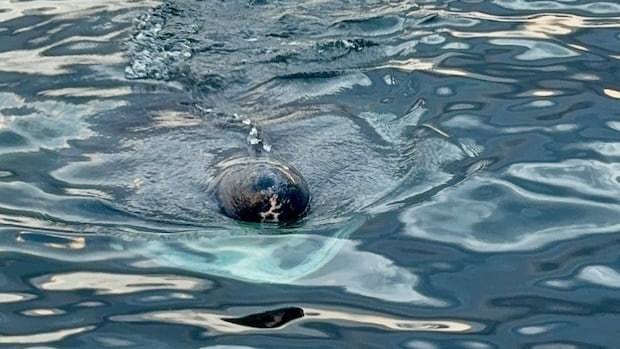[
A member of the world’s second-largest species of fish was spotted off the North Shore of P.E.I. by a group of people returning from a deep-sea fishing trip this past week.
Don Gauthier and his family spotted the basking shark just about a kilometre and half offshore near New London Bay and French River, at around 8:30 p.m. on Thursday.
“My partner was on her binoculars, just spotting things out, and she saw a bunch of birds just flying around in this one specific area and spotted some fin,” Gauthier told CBC News on Monday.
The boat’s captain said it could be some small whales, so Gauthier pulled out his phone to zoom in. He remembers saying: “I don’t think those are whales; I think that’s a shark.”
It was almost like it was entertaining us.— Don Gauthier
When the captain cut the boat’s engines, the fin started coming toward the vessel.
“That’s a basking shark,” the captain said, according to Gauthier. “I haven’t seen one of those in years.”
Gauthier said the shark approached the boat, moving in a side-to-side pattern.
“It was almost like it was entertaining us. It was very interesting because it — you know, it came up and you would see it open its mouth up. It was feeding, I would assume, and then it would go back down and come up from the other side of the boat.
“It was just unbelievable. I was so amazed at the size of it…. I was just completely stunned.”
‘A shark trying to be a whale’
Basking sharks are indeed quite large creatures, according to Boris Worm, a professor in marine conservation and biology at Dalhousie University in Halifax.
“They’re basically a shark trying to be a whale,” Worm said of Cetorhinus maximus.

Gauthier estimated the basking shark his family saw was between 20- and 30-feet long, or seven to 10 metres. Worm said that’s a normal-sized specimen, but the sharks can reach up to 12 metres.
He added there are no accounts of a basking shark ever causing harm to humans.
Over the past 30 years, Worm said, there have been only a few sightings off the Island’s North Shore in the Gulf of St. Lawrence. He said basking sharks aren’t exceedingly rare, but the species does typically swim in deeper waters.
“It’s a very large fish, it moves very slowly and it’s mysterious,” he said.
There’s a lot of things we would love to know about them, but they’re just really hard to track.— Boris Worm, Dalhousie University
“We don’t know how old they get, for example. We don’t know how many there are. We don’t know when their population is going up or down.
“There’s a lot of things we would love to know about them, but they’re just really hard to track.”
Worm said changing climate conditions could affect where basking sharks get their food, possibly leading them to waters off the North Shore to chase where their prey are going.
He noted a similar shift in feeding area has already led the endangered North Atlantic right whale to be more common in northern waters such as those in Atlantic Canada.
“It’s important that when you see this species to report these sightings, because every sighting helps us to understand the distribution a little bit better,” he said of the basking shark.
A new perspective
As for Gauthier, he said he had mixed feelings about the July 3 encounter.
“The initial feeling was definitely a little bit of concern, but it passed really quickly. When the captain explained to us what we were witnessing, it just turned immediately to just complete amazement,” he said. “I’ve never witnessed anything like this. This was spectacular.”
He said being so close to the basking shark gave him some new perspective.
“You realize how small you are in an environment like that, on the water, on the ocean, and you see this beautiful creature. I just hope people can appreciate the magnitude of it and just be more responsible with how we treat our climate,” he said.
“These creatures — you know, they depend on us in a way. Like, our actions really impact them.”
